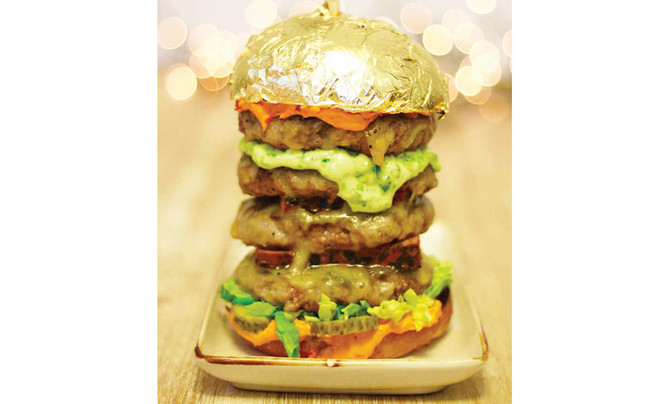We have all heard the expression “a heart of gold,” used to describe a kind person held in high regard. But can adding a crinkled piece of real gold on top of a juicy burger launch it to new culinary heights and force food lovers to hold the once-humble patty in high regard too?
This week, a tweet by a well-known Saudi journalist went viral due to its delicious subject — a SR5,000 burger served at The Ritz-Carlton, Jeddah.
The five-star hotel located in the Al Hamra District is known for its hospitality around the world but now it is making waves in Saudi Arabia for one of its more costly menu items.
One staff member told Arab News that there is indeed demand for this high-priced dish.
“It is called the Royal Burger due to its high price,” the staff member, who asked not to be named, said.
The burger is made with high-end ingredients such as Kobe beef, black truffle, foie gras, gruyere cheese, wild mushrooms, caviar and flaked gold leaf.
The world of fine dining is no stranger to the use of edible gold leaf, but it is usually reserved for desserts and sweet treats.
Since ancient times, Far Eastern cultures and civilizations have used edible gold in their dishes, saving the luxury metal for the most special of occasions.
If the gold leaf is what really makes this burger expensive, then it is readily available online — from specialty gold distributors, auction sites and even Amazon.com — if you wish to whip up a decadent dish at home.
Despite the staff member’s statement that the burger had garnered fans at the hotel, there have been some quizzical reactions on Twitter.
“I wonder how this person will feel in a few hours after the SR5,000 is digested,” one user tweeted.
Another said: “People, please stop these stupid comments, these royal foods are available all over the globe!”
“This is haram, go and help the poor, the world is witnessing famines,” another user commented.
• [email protected]
Decadent ‘Royal Burger’ sells for SR5,000 at Jeddah hotel
Decadent ‘Royal Burger’ sells for SR5,000 at Jeddah hotel

Pakistan coach says dressing room hurting after India capitulation

- Ishan Kishan’s 77 powered India to 175-7 before bowlers sealed 61-run victory on Sunday
- Pakistan collapsed to 13-3 and were bowled out for 114 in T20 World Cup Group A match
COLOMBO: Head coach Mike Hesson admitted Pakistan's players were hurting in the dressing room after their crushing 61-run defeat to arch-rivals India in Colombo on Sunday.
India dominated the T20 World Cup Group A match which had been in doubt until a few days ago when the Pakistan government cleared the team to play.
India, the defending champions, posted a fighting 175-7 after they were sent in to bat on a tacky R. Premadasa stadium pitch before they routed Pakistan for 114.
"There's a pretty disappointed dressing room in there at the moment, because they know how much it means to Pakistan," said Hesson, who was in charge for his fourth defeat in a row to India following three at last year's Asia Cup.
"We know that it's a huge event, Pakistan against India. We obviously won five games on the bounce before today so we were confident, but today we got outplayed," said Hesson.
Ishan Kishan's brilliant 77 helped India recover from a first-over dismissal of explosive opener Abhishek Sharma before Suryakumar Yadav (32) and Shivam Dube (27) lifted the total.
Pakistan slumped to 13-3 with India's Jasprit Bumrah removing Saim Ayub (six) and skipper Salman Agha (four) in the second over.
Usman Khan top-scored with 44 as Pakistan were bowled out in 18 overs, with 114 their third lowest total against India in all T20s.
Hesson defended the decision to bowl first at a stadium where three previous matches were won by the team batting first.
"I think the ball was spinning quite a lot initially and we started off well but I think the way Kishan played, he took the game away from us."
India's third win in as many games took them to the Super Eights stage while Pakistan now need to win their last game against Namibia on Wednesday.
The defeat further worsened Pakistan's win-loss record in World Cups against India to 1-8. They have lost all eight matches to India at the ODI World Cup.
"We have to pick ourselves up and make sure that we're very good in two or three days," said Hesson.
"We have played some good cricket in the lead-up to this World Cup so we're confident to do well in the tournament."









